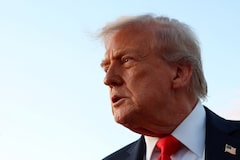On September 9, 2025, United States President Donald Trump made a striking statement that has sent ripples through the international community, asserting that a military strike on Qatar was a decision spearheaded by Israeli Prime Minister Benjamin Netanyahu, not the sitting U.S. president. This claim, made during a public appearance, has ignited intense debate about the nature of U.S.-Israel relations, the autonomy of allied nations in military decision-making, and the broader geopolitical implications for the Middle East. The statement comes at a time of heightened tensions in the region, with Qatar playing a pivotal role as a mediator in conflicts and a key player in global energy markets. This article delves into the details of Trump’s remarks, the context surrounding the alleged strike, and the far-reaching consequences for international diplomacy.
The Context of Trump’s Statement
Donald Trump, who served as the 45th and 47th President of the United States, has long been known for his outspoken style and willingness to challenge conventional narratives. His latest remarks, made during a campaign-style event in Florida, were aimed at clarifying what he described as “misinformation” about U.S. involvement in a recent military operation targeting Qatar. According to Trump, the decision to launch the strike was made independently by Israel under Netanyahu’s leadership, with the U.S. playing a secondary role, if any, in the operation.
The statement raises several critical questions: Why would Israel, a staunch U.S. ally, undertake such a significant military action without direct U.S. approval? What motivated the strike on Qatar, a nation that hosts a major U.S. military base and serves as a key diplomatic intermediary in the Middle East? And what does Trump’s claim reveal about the dynamics of decision-making between Washington and Jerusalem during his administration and beyond?
To understand the gravity of Trump’s remarks, it’s essential to examine the geopolitical landscape of the Middle East in 2025. The region remains a volatile arena, marked by ongoing conflicts, shifting alliances, and competing interests among global powers. Qatar, a small but influential Gulf nation, has emerged as a central player in regional diplomacy, leveraging its vast natural gas wealth and strategic relationships to mediate conflicts in Gaza, Afghanistan, and beyond. However, its ties to controversial groups, including certain Islamist movements, have long been a point of contention with other Gulf states and Israel.
Qatar’s Role in the Middle East
Qatar, with its capital in Doha, is a nation of paradoxes. Despite its small size and population, it wields outsized influence due to its liquefied natural gas (LNG) exports, which make it one of the world’s wealthiest countries per capita. The Al Thani ruling family has pursued an ambitious foreign policy, positioning Qatar as a mediator in conflicts while maintaining relationships with a wide array of actors, from the United States to Iran, Hamas, and the Taliban.
One of Qatar’s most significant roles in recent years has been its mediation efforts in the Israeli-Palestinian conflict. Doha has facilitated ceasefire agreements between Israel and Hamas, channeling funds to Gaza to support humanitarian needs while navigating the delicate balance of maintaining diplomatic ties with both Israel and Palestinian factions. This role has earned Qatar praise from some quarters for its pragmatism but criticism from others, including Israel and its hardline supporters, who view Qatar’s financial support for Gaza as indirectly bolstering Hamas.
Qatar’s relationship with the United States is equally complex. The Al Udeid Air Base, located southwest of Doha, is the largest U.S. military facility in the Middle East, hosting thousands of American troops and serving as a hub for U.S. Central Command (CENTCOM) operations. This strategic partnership has made Qatar a critical ally in U.S. efforts to counter terrorism, project power in the region, and maintain stability in the Gulf. However, Qatar’s independent foreign policy, including its refusal to fully align with the Saudi-led bloc against Iran, has occasionally strained relations with Washington and its Gulf neighbors.
The Alleged Strike on Qatar
While Trump’s statement did not provide specific details about the timing, nature, or target of the alleged strike on Qatar, the claim has sparked intense speculation. Was the operation a targeted airstrike on a specific facility, a cyberattack, or a broader military engagement? Neither the Israeli government nor the U.S. administration has officially confirmed the occurrence of such a strike, leaving analysts to piece together possible scenarios based on regional dynamics and recent events.
One plausible explanation is that the strike was related to Qatar’s perceived support for groups like Hamas or its diplomatic overtures to Iran, both of which are viewed with suspicion by Israel. Netanyahu, known for his hawkish stance on security matters, has repeatedly emphasized Israel’s right to act unilaterally to protect its interests. A strike on Qatar could have been intended to disrupt financial or logistical networks linked to groups Israel deems as threats, though such an action would carry significant risks given Qatar’s strategic importance to the U.S. and its role in global energy markets.
Another possibility is that the strike was a preemptive move to counter a specific threat emanating from Qatar or its allies. For instance, Israel has long been concerned about Iran’s influence in the region, and Qatar’s relatively open channels with Tehran could have raised red flags in Jerusalem. Alternatively, the strike could have targeted a non-state actor operating within Qatar, such as a terrorist cell or a cyberwarfare unit, without directly implicating the Qatari government.
The lack of official confirmation from Israel or the U.S. complicates efforts to verify Trump’s claims. However, his assertion that Netanyahu acted independently suggests a degree of autonomy in Israel’s military decision-making that could have profound implications for the U.S.-Israel alliance. If true, it would indicate that Israel felt confident enough to launch a significant operation without seeking prior approval from its most powerful ally, potentially signaling a shift in the balance of power within the relationship.
U.S.-Israel Relations Under Scrutiny
The U.S.-Israel relationship has been a cornerstone of American foreign policy in the Middle East for decades. The two nations share intelligence, coordinate military operations, and collaborate on defense technologies, with the U.S. providing billions of dollars in annual military aid to Israel. During Trump’s first term (2017–2021), this relationship reached new heights, with the U.S. recognizing Jerusalem as Israel’s capital, moving its embassy there, and brokering the Abraham Accords, which normalized relations between Israel and several Arab states.
However, Trump’s recent comments suggest a more complex dynamic during his second term or in the lead-up to 2025. By claiming that Netanyahu, not the U.S. president, decided on the Qatar strike, Trump appears to distance himself and the U.S. from the operation, potentially to shield the administration from domestic or international backlash. This raises questions about the extent to which the U.S. was informed or consulted about the strike and whether there were tensions between Washington and Jerusalem over the decision.
Historically, Israel has conducted unilateral military operations, such as the 1981 airstrike on Iraq’s Osirak nuclear reactor and the 2007 strike on a suspected Syrian nuclear facility. These actions, while controversial, were generally met with tacit U.S. approval after the fact. A strike on Qatar, however, would be far more provocative given the country’s status as a U.S. ally and its strategic importance. If Israel acted without U.S. consent, it could indicate a willingness to prioritize its own security concerns over the broader interests of the U.S.-led regional order.
Regional and Global Reactions
The implications of Trump’s statement extend far beyond U.S.-Israel relations, potentially reshaping dynamics across the Middle East and beyond. Qatar, as a member of the Gulf Cooperation Council (GCC), maintains close ties with Saudi Arabia, the United Arab Emirates, and other Gulf states, despite periodic tensions. A military strike on Qatari soil would likely provoke a strong reaction from these countries, particularly if they perceived the action as undermining Gulf security.
Saudi Arabia, which led a blockade against Qatar from 2017 to 2021 over its ties to Iran and alleged support for extremism, might view an Israeli strike as a vindication of its concerns. However, it could also see the action as a destabilizing move that risks escalating tensions in an already volatile region. The UAE, which has deepened its ties with Israel since the Abraham Accords, might find itself caught between supporting its Gulf neighbor and maintaining its strategic partnership with Jerusalem.
Iran, a regional rival of both Israel and the U.S., would likely seize on the strike to portray Israel as an aggressor and rally support among its allies and proxies. Tehran’s response could range from diplomatic condemnation to mobilizing groups like Hezbollah or the Houthis to escalate attacks on Israeli or U.S. targets. Such a scenario would further complicate efforts to stabilize the region and could draw the U.S. into a broader conflict.
Globally, the strike would likely draw condemnation from nations critical of Israel’s actions, including members of the United Nations General Assembly. Countries like China and Russia, which have sought to expand their influence in the Middle East, could use the incident to challenge U.S. hegemony and portray Washington as unable to control its allies. The European Union, already strained by internal divisions over Middle East policy, would face pressure to respond, potentially complicating its relationships with both Israel and Qatar.
The Energy Angle
Qatar’s role as a leading exporter of LNG adds another layer of complexity to the situation. The global energy market remains highly sensitive to disruptions in the Middle East, particularly in the Gulf, which accounts for a significant portion of the world’s oil and gas supply. A military strike on Qatar, even if limited in scope, could roil energy markets, drive up prices, and exacerbate inflationary pressures worldwide.
In 2025, the global economy is still recovering from the energy shocks of previous years, including the fallout from the Russia-Ukraine conflict and subsequent sanctions on Russian energy exports. Qatar has stepped in to fill some of the gaps, supplying LNG to Europe and Asia and helping to stabilize markets. Any disruption to Qatar’s energy infrastructure or its ability to export gas would have immediate consequences for countries reliant on its supplies, potentially triggering a new wave of economic uncertainty.
Domestic Political Fallout in the U.S.
Trump’s statement also has significant implications for U.S. domestic politics. By attributing the Qatar strike to Netanyahu, Trump may be attempting to deflect criticism from his administration or distance himself from a controversial decision. However, this move could backfire, raising questions about his leadership and the extent of U.S. control over its allies. Critics may argue that allowing Israel to act unilaterally undermines U.S. authority and risks entangling the country in conflicts it did not choose.
Within the Republican Party, Trump’s remarks could deepen divisions between traditional hawks, who prioritize a strong U.S.-Israel alliance, and isolationist factions, who advocate for a reduced U.S. presence in the Middle East. Democrats, meanwhile, may seize on the statement to criticize Trump’s foreign policy as erratic or overly deferential to Israel, particularly if the strike leads to negative consequences for U.S. interests.
Public opinion in the U.S. is likely to be divided as well. Supporters of Israel may view the strike as a necessary action to counter threats, while others may see it as a reckless escalation that endangers American troops and economic stability. The presence of the Al Udeid Air Base in Qatar could become a focal point of debate, with some questioning why the U.S. maintains such a significant military presence in a country that may be targeted by its closest ally.
The Broader Geopolitical Chessboard
Trump’s claim that Netanyahu decided on the Qatar strike must be viewed within the broader context of global power dynamics. The Middle East remains a battleground for influence among the United States, China, Russia, and regional powers like Iran and Turkey. Qatar’s unique position as a mediator and energy supplier has allowed it to navigate these competing interests, but it also makes the country a potential flashpoint.
For the U.S., the incident underscores the challenges of maintaining a coherent Middle East policy in an era of multipolarity. The Biden administration, or its successor in 2025, will need to balance its commitments to Israel, its strategic partnership with Qatar, and its broader goals of countering Iran and stabilizing the region. A misstep could weaken U.S. credibility and embolden its rivals.
For Israel, the alleged strike reflects the challenges of operating in a region where threats are multifaceted and alliances are fluid. Netanyahu’s government, facing domestic pressures and ongoing security concerns, may see unilateral action as the only way to address immediate threats. However, such actions risk alienating partners and escalating conflicts that could spiral beyond Israel’s control.
Hypothetical Scenarios and Future Implications
While the details of the alleged strike remain unclear, several hypothetical scenarios could explain Trump’s statement and its implications:
A Targeted Operation Against a Non-State Actor: Israel may have conducted a limited strike on a specific target in Qatar, such as a financial network or cyber operation linked to Hamas or another group. This would align with Israel’s history of targeted strikes and could explain why the U.S. was not directly involved. The fallout would depend on the extent of the damage and Qatar’s response.
A Miscalculation or Miscommunication: The strike could have been the result of a miscalculation by Israel, acting on incomplete intelligence or without fully anticipating the consequences. If the U.S. was not informed in advance, it could strain the alliance and prompt a reassessment of coordination protocols.
A Strategic Message to Iran: The strike may have been intended as a warning to Iran, using Qatar as a proxy to demonstrate Israel’s willingness to act decisively against Tehran’s allies. This would be a high-risk strategy, given Qatar’s ties to the U.S. and its role in global energy markets.
A Domestic Political Ploy: Trump’s statement could be a calculated move to shift blame or generate headlines, particularly if he is seeking to reassert his influence in U.S. politics. By framing Netanyahu as the decision-maker, Trump may be appealing to his base while avoiding responsibility for a controversial action.
Looking ahead, the incident could reshape U.S.-Israel relations, U.S.-Qatar ties, and the broader Middle East landscape. The U.S. may seek to mediate between Israel and Qatar to prevent further escalation, while also reassuring Gulf allies of its commitment to their security. Israel, meanwhile, will need to navigate the diplomatic fallout and justify its actions to both domestic and international audiences.
Conclusion
Donald Trump’s claim that Benjamin Netanyahu, not the U.S. president, decided on a military strike against Qatar has thrust the complex dynamics of U.S.-Israel relations into the spotlight. The statement raises critical questions about the autonomy of allied nations, the balance of power in the Middle East, and the risks of unilateral actions in a volatile region. While the details of the alleged strike remain murky, its implications are profound, potentially affecting energy markets, regional alliances, and global power dynamics.
As the international community awaits further clarification, the incident serves as a reminder of the delicate balance required to maintain stability in the Middle East. For the United States, Israel, and Qatar, the path forward will require careful diplomacy, strategic restraint, and a commitment to addressing the underlying tensions that fuel such actions. Whether Trump’s remarks prove to be a turning point or a footnote in the region’s history, they underscore the enduring challenges of navigating a world where alliances, interests, and power are in constant flux.







